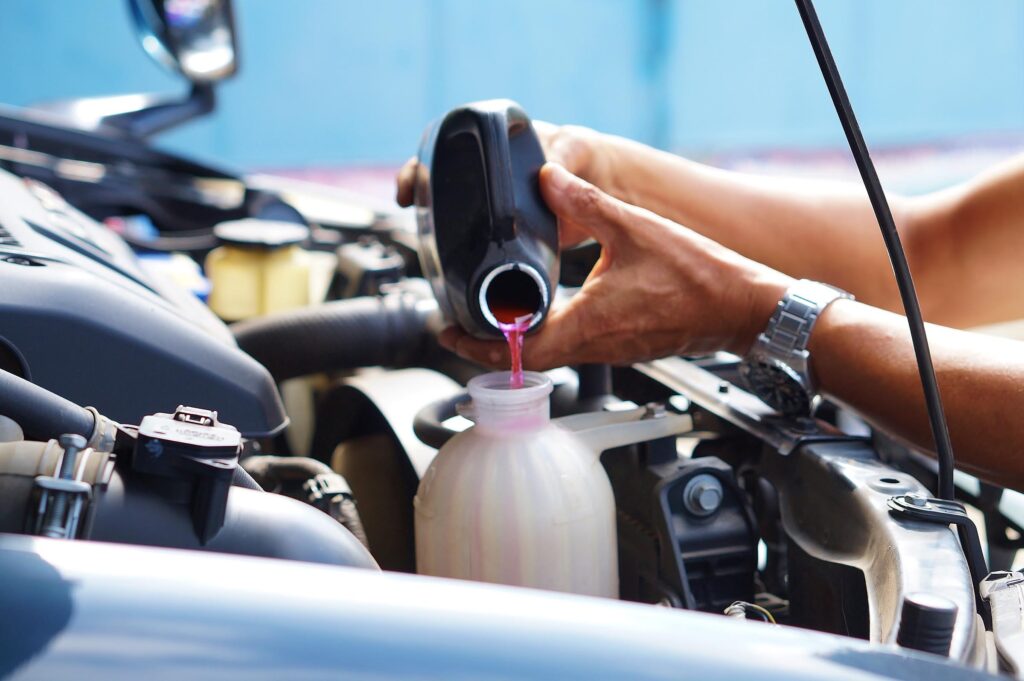As a car owner, you must pay attention to the noise your engine makes.
A low hum when the vehicle is idle shouldn’t be a cause for concern, but noises like grinding, clunking, and squeaking might mean you should make a quick trip to the nearest auto repair shop.
Another noise you shouldn’t hear in your vehicle is sloshing.
What’s Causing that Sloshing Sound?
If you hear water or a different type of fluid sloshing around in your car every time you make a turn, start the vehicle, turn on the heater, or even at random times, these could be the reasons why.
There’s Air in the Cooling System

Air in the cooling system means there’s a leak somewhere in the hoses, radiator, water pump, or engine.
If there’s air in the cooling system, the coolant tends to drain out of the heater core when the engine is off. When the engine turns on, the water pump forces a surge of coolant into the heater core, creating a sloshing sound.
There’s a Gasket Leak Somewhere
A blown head gasket will cause coolant to leak into the combustion chamber. Once this happens, white smoke might come out of the exhaust pipe and give the engine oil a milky consistency.
Coolant can also leak into the lower crankcase, which can contaminate the oil with scum. Bubbles in the coolant are a common indicator of a defective head gasket or cracked cylinder head.
To check for bubbles, you can remove the coolant pump belt to stop the pump from working. Then, remove the radiator cap and start the engine.
Your Vehicle Has a Clogged Evaporator Drain
A clogged drain could’ve trapped water in the heating and cooling system, creating a sloshing sound in your car.
The cooling system is usually sealed, but a leak in the HVAC box can cause water to get trapped in there.
The trapped water in these systems is often a result of condensation, which occurs whenever you turn on the air conditioning (A/C) unit. You might also notice that the passenger side floor is damp because of this issue.
You Have a Clogged Door Drain
The door drains can get clogged with debris after some time, trapping water from rain or whenever you wash your car.
How to Fix the Sloshing Sound in Your Car
The solution to this problem depends on what caused it in the first place.
Minor issues like a clogged drain might require a simple fix, like cleaning the drain. But for more severe problems like coolant leaks, you might need to replace worn-out gaskets and top up on coolant.

A Closer Look at the Cooling System
Your car’s sloshing sound is almost always attributed to the presence of air bubbles in the cooling system. Let’s take a closer look at how the system functions and how it contributes to your vehicle’s optimal operation.
The engine’s heat output, radiator size, coolant type, water pump size, fan type, thermostat, and system pressure are some factors that affect the cooling system’s operation.
Essentially, the cooling system keeps the head and cylinder wall’s temperature in check for maximum efficiency. It removes about one-third of the engine’s heat while another third dissipates into the exhaust system.
Coolant is crucial in maintaining the engine’s operating temperature. It’s generally a mixture of antifreeze and water that transfers heat from the engine to the radiator, where the heat dissipates into the outside air.
Coolant also protects the engine and the cooling system from rust and corrosion. It continually recirculates through the cooling system. It goes through the engine and radiator via hoses and clamps.
Other Engine Noises That Could Mean Trouble
Aside from a sloshing sound, here are other engine noises to look out for.
Squealing
Squealing noises are usually attributed to a failing serpentine belt, which is the part that controls most engine accessories. However, problems in the steering system or worn-out brake pads can also cause it.
If you hear this noise whenever you depress or release the clutch pedal, you might be dealing with a worn-out pilot bearing, clutch, or another component in a manual transmission.
Also keep in mind that squealing noises can also come from anywhere in the drive belt system, including the water pump and alternator.
Keep in mind that squealing noises can also come from anywhere in the drive belt system, including the water pump and alternator.
–Anthony Harlin, ASE Certified Master Automobile Technician
Grinding
Grinding noises are usually caused by worn-out brake linings, a bent shoe web, or brakes that weren’t assembled properly. Worn-out bearings can also create the same noise when driving or idling.

Grinding noises when making a turn can be attributed to issues with the strut bearing, power steering gear, or the rack and pinion system.
Knocking
A knocking noise usually indicates a problem with the engine rotating assembly, pistons, bearings, oil flow, low oil, and other worn-out engine components.
Popping
A clogged fuel filter, ignition problems, faulty spark plugs and wires, and a malfunctioning catalytic converter are some common causes of popping noises.
Diagnosing Engine Noises
Different engine noises can indicate issues in various engine components, which can be tricky to identify if you’re not well-versed in automotive repair.
To get an accurate diagnosis, have a trained professional inspect your vehicle. It’s also important to resolve these issues as soon as possible to prevent them from getting worse and avoid expensive repair bills.
The Bottom Line
The severity of the issue that a sloshing sound indicates can vary.
The problem can range from something as simple as a clogged door drain to something more alarming like air bubbles in the cooling system. Either way, it’s a good idea to have your vehicle checked right away.
Lastly, it pays to know what your engine sounds like whenever there’s something wrong. Various sounds can mean different issues that shouldn’t be left unaddressed for too long.
Any information provided on this Website is for informational purposes only and is not intended to replace consultation with a professional mechanic. The accuracy and timeliness of the information may change from the time of publication.































This was super helpful – thank you so much for taking the time to write this up, and to add a summary at the top for those of us who can get intimidated by mechanics!